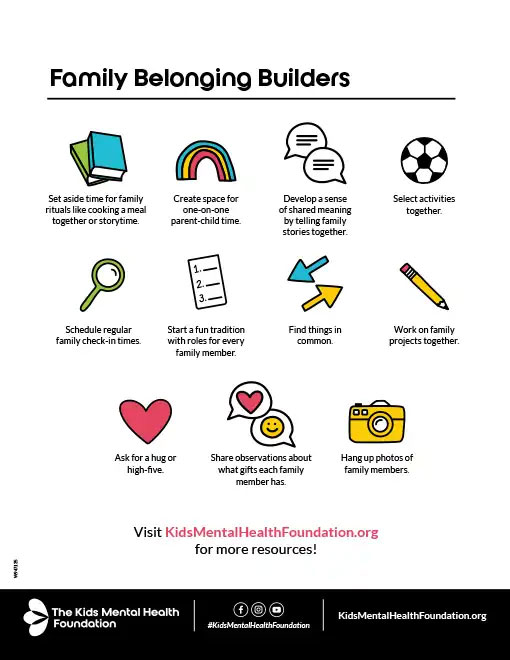Belonging Boosts Kids' Mental Health
Article Summary
- Children who feel connected to their families, schools and neighborhoods experience mental health benefits.
- Feelings of belonging can be increased by modeling healthy relationship skills, providing them with opportunities and considering your child’s unique temperament.
Because people are social creatures, a sense of belonging is a fundamental human need. Children who feel connected to their families, their schools, their neighborhoods, or other meaningful groups experience mental and physical health benefits. And there are things we can do to increase their feelings of belonging!
Benefits of Belonging
Children who feel that they belong in one or more areas of their lives tend to feel better about themselves and more connected to their community. This helps them to feel more secure. They tend to:
- Do better academically
- Be less focused on being bullied or excluded
- Build friendships easier
- Learn new skills
A strong sense of belonging benefits all four parts of a child’s mental health:
- Social health - the ways that your child relates to others
- Emotional health - your child’s feelings of connectedness or loneliness
- Cognitive health - your child’s ability to think and solve problems
- Physical health - your child’s body and immune system
Risks of Not Belonging
When children don’t experience a sense of belonging, they are at a much higher risk of feeling lonely. Lonely children may constantly be on edge, expecting to be excluded by the people around them at any given moment. This can lead to:
- Lack of concentration at school
- Poorer academic performance
- Increases in the risk of depression and anxiety
- Weakened immune system
How Can I Improve My Child’s Belonging?
A large study across many countries found that a good relationship with parents positively predicted a child’s sense of belonging in adulthood. To help bolster your child’s sense of belonging and connectedness, try these ideas:
- Model healthy relationship skills. Kids who know how to listen, share, cooperate and follow directions are more likely to feel a sense of connectedness with others. Social skills don’t guarantee a sense of belonging, but they provide common ground. Parents can also increase a child’s social skill development by coaching them on ways to manage intense emotions. For example, parents can help children use healthy calm down strategies when angry instead of acting out toward peers. With teenagers, parents can model how to solve problems with peers (“OK, let’s get a better idea of what each of you are feeling and then come up with a compromise”).
- Provide opportunities for belonging and connection. Invite friends over, attend special events at school, or allow your child the chance to interact meaningfully with others to build a sense of connectedness. Without social opportunities, your child’s sense of belonging may decline, which you may have experienced during the early pandemic lockdowns.
- Consider your child’s motivation level. Different children tend to develop stronger or weaker senses of belonging. Very social children may be highly motivated to connect with others. Other kids, including children on the autism spectrum, may have a lower motivation for social belonging. All children can benefit from a sense of belonging, so it is important for parents to invite people over to the house and provide social opportunities, such as play groups. However, it’s also important to understand your child’s motivational levels. If you’re concerned about your child’s motivation to socialize, it can be helpful to get a professional opinion from a mental health provider to rule out things like social anxiety.
- Give your child perspective. Your child’s perception of belonging can be strongly influenced by experience. If your child experienced bullying or rejection in the past, they may be more sensitive to signs of not fitting in. Fortunately, social connection is based less on how many friends your child has and more on the quality of their relationships. Children with very few social connections can feel very strongly that they belong if they have high-quality connections. Parents can also help their children think differently about (perceived) negative interactions by coming up with alternative, neutral explanations of what happened with a peer or teacher.
Download our belonging builder handout for more ways to build a sense of belonging!
References
Counted V. Allen K. Johnson BR. VanderWeele TJ. The roots of belonging: childhood predictors of belonging in 22 countries. Preprint at OSF. (2025).
Diendorfer T. Seidl L. Mitic M. Mittmann G. Woodcock K. Schrank B. (2021). Determinants of social connectedness in children and early adolescents with mental disorder: A systematic literature review. Developmental Review, 60, 100960.
Goossens L. (2018). Loneliness in adolescence: Insights from Cacioppo's evolutionary model. Child Development Perspectives, 12(4), 230-234.
Joyce H. Early T. (2014). The impact of school connectedness and teacher support on depressive symptoms in adolescents: A multilevel analysis. Children and Youth Services Review, 39, 101-107.
Parr E. Shochet I. Cockshaw W. Kelly R. (2020). General belonging is a key predictor of adolescent depressive symptoms and partially mediates school belonging. School Mental Health, 12(3), 626-637.
Qualter P. Brown S. RotenbergK. Vanhalst J. Harris R. Goossens L. Munn P. (2013). Trajectories of loneliness during childhood and adolescence: Predictors and health outcomes. Journal of Adolescence, 36(6), 1283-1293.
 Copy Link
Copy Link




